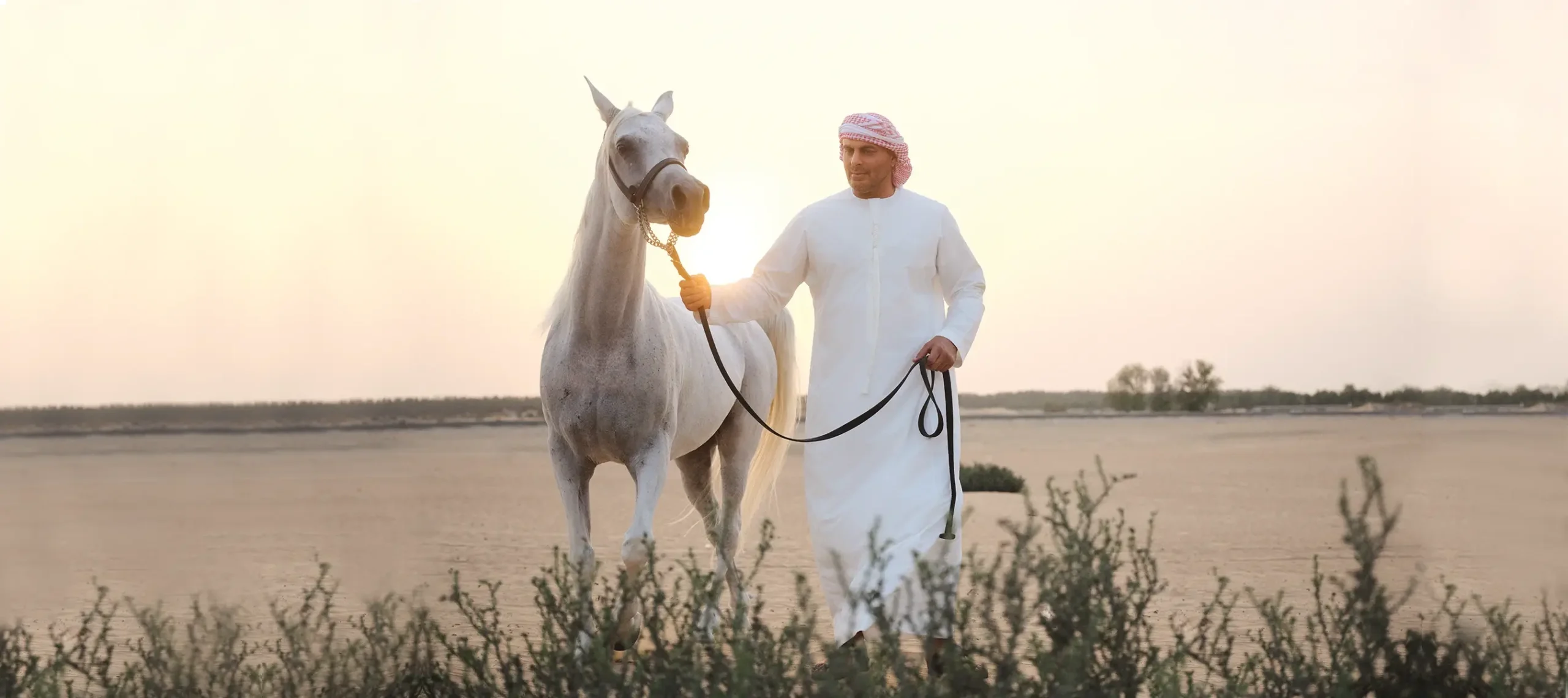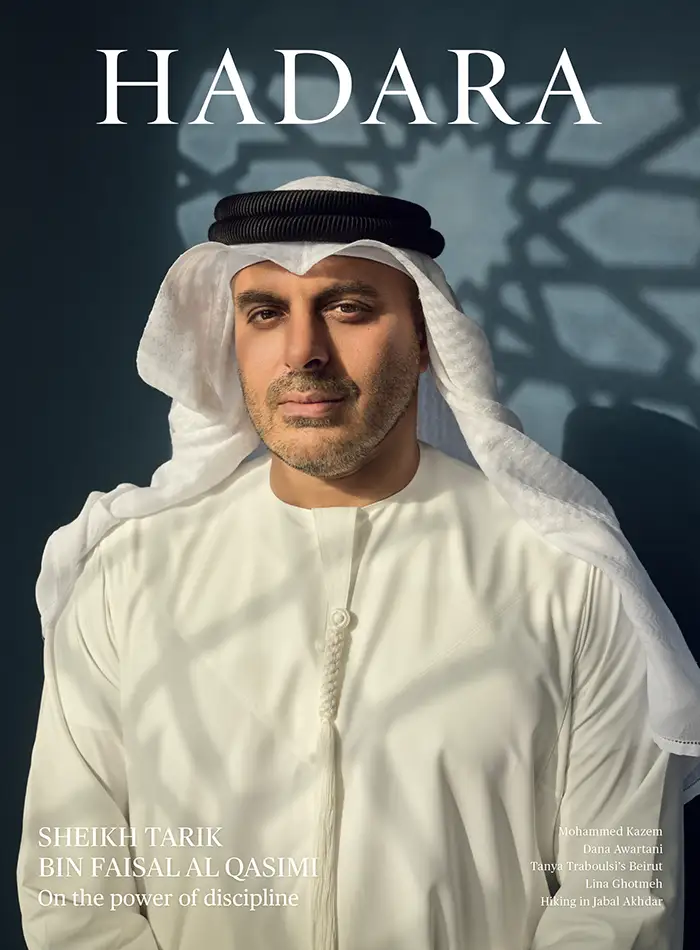The Tactician
Sheikh Tarik bin Faisal Al Qasimi on the power of dedication and discipline.
Words CATHERINE MAZY Photos ŽIGA MIHELČIČ
Sheikh Tarik bin Faisal Al Qasimi exudes the relaxed confidence of a winner. He smiles easily and never misses a chance for a self-deprecating laugh. The jiu-jitsu black belt and chairman of the Emirates Investment Group doesn’t try too hard, with all that implies about longing for the unreachable. Instead, he works hard, and gets results.
His typical day is highly structured and starts early, with breakfast with his grandchildren, aged three and a half and two years old. “They’re the joy of my life,” he says.
After breakfast, he does an hour of Pilates, “to make sure all the joints are functioning well. I had some injuries from a car accident when I was young. Those kinds of injuries haunt you later. My physio suggested Pilates to keep my core strong and to learn to isolate muscles. It’s more for the results I get out of it that makes it consistent because some of the holds are just miserable.”
After a full day at the office, he hits the gym to lift weights or do boxing before an hour or more of jiu-jitsu, his passion. That’s followed by two hours of majlis.
His first sport, as a child in Egypt, where his father was studying medicine, was swimming, but he soon added equestrian sports, even competing. When he was 10, his family moved back to Sharjah and he took up basketball, maintaining athletic pursuits alongside studies and work. In 2009, “the financial world was collapsing. I wanted a different vacation than a city or a beach. An active holiday,” he says. And not just any activity—it had to require complete focus. “If you’re running, your mind can’t switch off,” he says. “In a lot of sports, disengagement doesn’t happen. Any time you’re in combat, you can’t think of anything else. If you [look] away, you might get punched. You’re 100% there.”
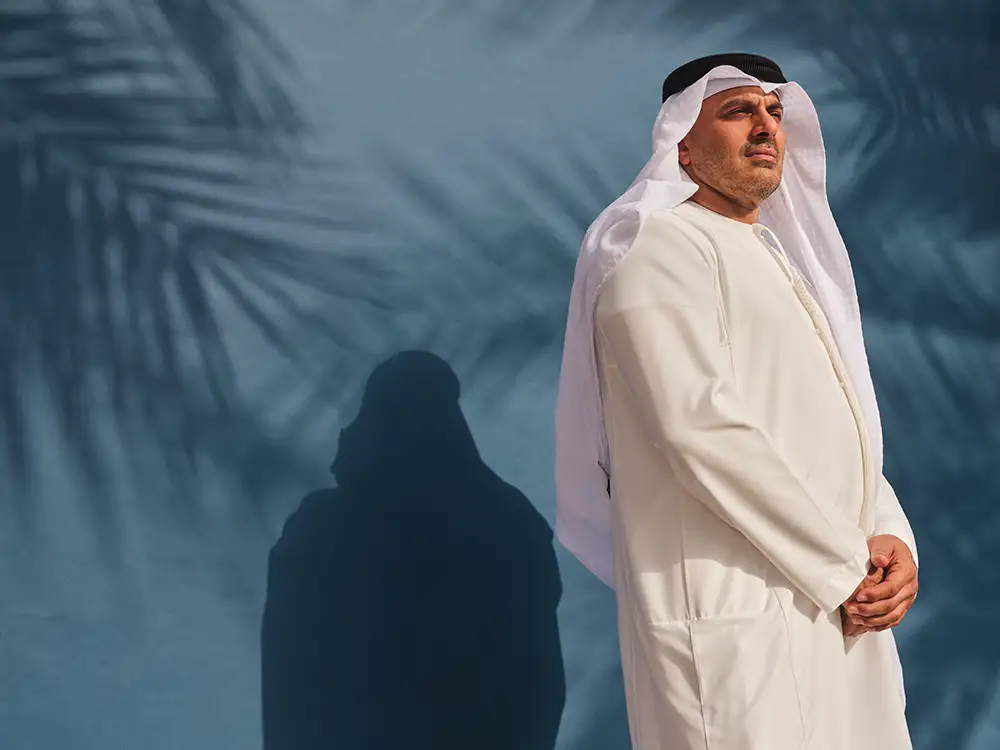
Sheikh Tarik is passionate about Arabian horses. When he was younger, he even competed in equestrian sports.
He signed up for a 10-day programme in Muay Thai in Phuket, Thailand—so intense that he lost six or seven kilogrammes from the twice-daily sessions. And he developed a passion for martial arts.
After the vacation, he wanted to continue with that level of intense practice, but couldn’t find facilities with the right level of coaching until a friend suggested a strict Brazilian jiu-jitsu coach in Abu Dhabi. “I had heard of jiu-jitsu, I went and tried a class. They say it’s like playing chess with your body. Of course, you have to be strong, flexible, have stamina. But if you don’t have a certain level of intelligence and think two steps ahead, you’re never going to get to a high level. It’s very tactical, very strategic. If you only use brute force, you can’t move up. You need to be agile, strong, with decent cardio, but being tactical is the key to becoming a champion.”
He stayed with it, as an antidote to the pressures of the day. “When you are fully engaged, you use 90-95% of your capacity. You are in a semi-combat situation. It gives you the ability to take out all the stress from the day. And dealing with the tactical situations makes it an interesting sport to me,” he says. “When you’re in a bad situation in jiu-jitsu, say somebody is sitting on your chest and you’re choking, you don’t panic. So, when you go to work, if you have that talent, you have that fire, it gives you an ability to deal with chaos or with any issues in business. The knee-jerk reaction isn’t necessarily the best reaction in jiu-jitsu or in business. You have to do things in a pragmatic manner.”
Sheikh Tarik is the second Emirati to hold a black belt in jiu-jitsu and has many international medals to his name—and now so do others, thanks to him pioneering a path.
“Mentoring young entrepreneurs is something I’m extremely proud of. I enjoy building businesses from the ground up, taking components and putting them together, identifying the opportunities and turning it into a viable business.”
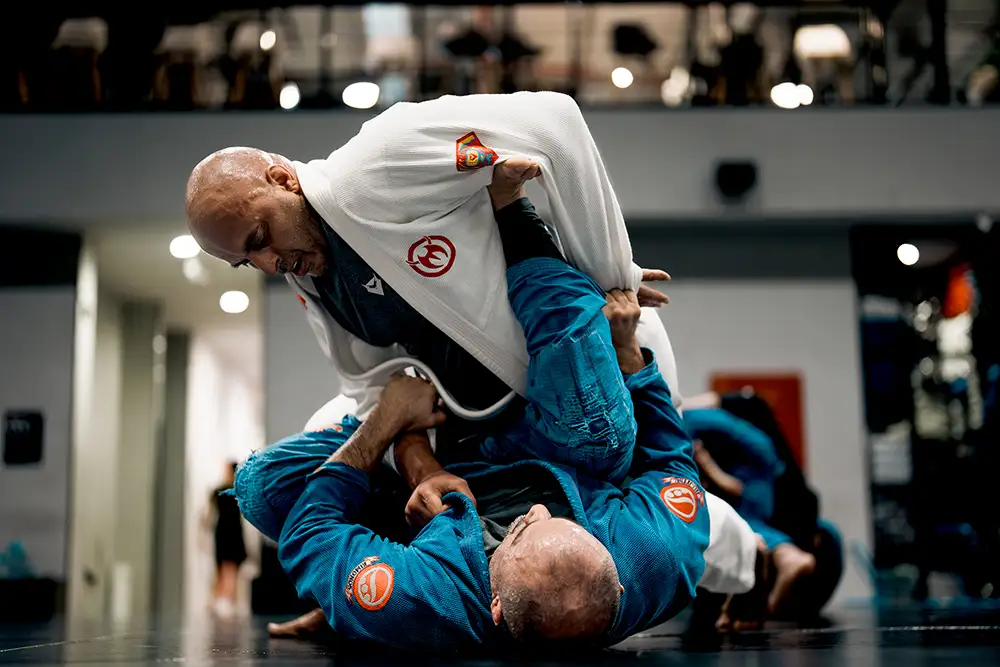
Sheikh Tarik is the second Emirati to hold a black belt in jiu-jitsu and has many international medals.
He likens the sport to playing chess with your body: it requires stamina, but also tactics and strategy.
Taking up a sport as an adult and competing at an international level while holding demanding posts in government, business and investment is emblematic of how Sheikh Tarik lives life at full throttle. He learned to juggle work and sport when he was young. While he was earning his bachelor’s in business administration from the Higher Colleges of Technology in Dubai, he was captain of the basketball team and also worked evenings at his father’s private hospital, starting at 17. “My first job was as a receptionist,” he says. “It was good for building character.”
He also worked in public relations and in the financial department at the clinic, giving him real-world insights during his studies in finance. He went on to get a master’s degree in international finance from the University of Westminster in London. When he returned to Sharjah, His Highness Sheikh Dr. Sultan bin Mohamed Al Qasimi, the Ruler of Sharjah, gave him the opportunity to work for the government, to serve the emirate and the people of Sharjah, first in His Highness’s office, and then as chairman of the Sharjah Airport Free Zone and the Hamriyah Free Zone Authority, which was relatively new at the time.
“I was quite young, and the job was challenging,” he says. “It was like jiu-jitsu,” requiring full attention and strategic thinking. “I committed time and energy to make sure these were successful ventures. In a short time, by the grace of God, I managed to make them successful.”
After a year, he started adding responsibilities: chairman of the Sharjah Committee for Economic Development, merging three departments—industry, economy, and licensing for Sharjah municipality—into a Department of Economic Development.
“We took the idea that anybody conducting business is a partner, so I make sure he succeeds. I’m making your life easier. It’s something we implemented over the 10 years that I served in government. His Highness was extremely kind, and I am extremely grateful that he trusted me. He saw something in me and took a bet on me. I am glad it was fruitful,” Sheikh Tarik says.
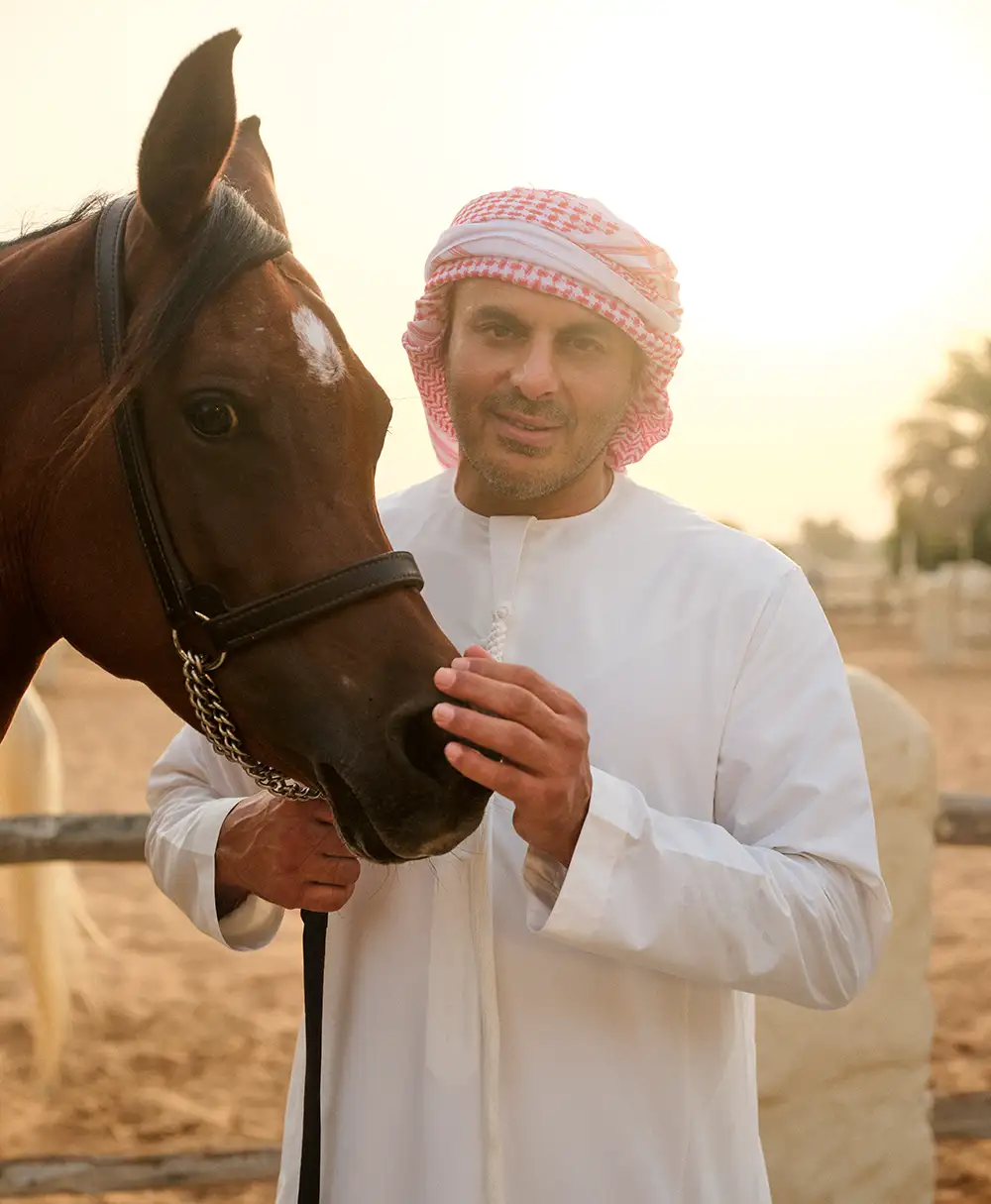
It was during this period that Sheikh Tarik embraced the idea of public-private partnerships. “If they have know-how, they will be more competitive than the government,” he explains. “Any government enterprise that’s not driven by profits ends up having a lot of fat. It gives a service, but a private company can do it for less.”
After a decade in government, Sheikh Tarik shifted to the private sector, leading major investment initiatives as chairman of Emirates Investment Group and ENSHAA PSC, in public markets, real-estate development, construction, and healthcare facilities. Marquee projects include the Emirates Financial Towers in Dubai, the Ritz-Carlton Residences in Singapore, and the Palazzo Versace Hotels in Dubai and Australia.
Such large, high-profile projects may grab attention, but Sheikh Tarik knows that smaller businesses are the backbone of any economy. “Across the world, 70% of all economies are based on small and medium-size enterprises,” he says. “These are all entrepreneurs. It should be a priority for every government to support the young, national entrepreneurs.”
This acknowledgment of the importance of entrepreneurs has led him to mentor and invest in startups, notably as chairman of the Arab Union for Entrepreneurship. “Mentoring young entrepreneurs is something I’m extremely proud of,” he says. “I enjoy building businesses from the ground up, taking components and putting them together, identifying the opportunities and turning it into a viable business.”
While mentorship is important, Sheikh Tarik credits the government role as well. “Where government support comes in is to give people guidance based on past experiences, to mitigate some risks. A 25-year-old is purely focused on developing the concept, without realising the pitfalls or knowing how to manage cash flow, for example.”
The ecosystem of mentors and support has blossomed in the UAE, compared with a couple of decades ago. “There are multiple sources of funding, guidance, incubators,” he says. Some are pan-Arab, some are national, and some, like Sheraa, are based in individual emirates. “They are all trying to get as many young Emiratis as possible to be successful entrepreneurs.”

